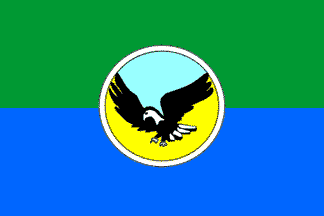
image by Jaume Ollé, 26 Apr 1999

Last modified: 2015-07-18 by zoltán horváth
Keywords: daghestan | ethnic group | nogai | kumukh | triskelion | crescent: points to top fly (white) | lezgi | savdal | bird | laks | avars | dido | tsezy | aghul |
Links: FOTW homepage |
search |
disclaimer and copyright |
write us |
mirrors
In Daghestan live about 35 different ethnic groups.
Some of these peoples have their own flags.
António Martins, Nov 1998
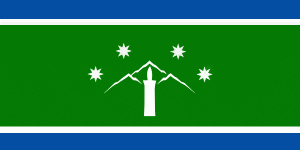
Wikipedia now includes a flag for the Aghuls, a nation located in Dagestan.
See this link http://en.wikipedia.org/wiki/Aghul_people.
Jason Saber, 01 February 2015
Image source is
http://www.vexillographia.ru/russia/minority.htm, See -
http://en.wikipedia.org/wiki/File:Aghul_flag.svg
Victor Lomantsov, 02 February 2015
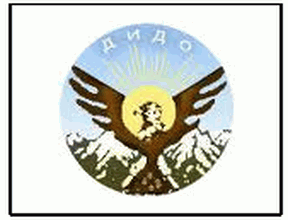 Chrystian Kretowicz, 21 Aug 2011
Chrystian Kretowicz, 21 Aug 2011
Let me share with you the flag of a small ethnic group in Dagestan -
Dido (Tsezy).
More info on them at:
http://www.facebook.com/photo.php?fbid=1731544948231&set=a.1717351273398.69807.1826737355&type=1&theater
Chrystian Kretowicz, 21 Aug 2011
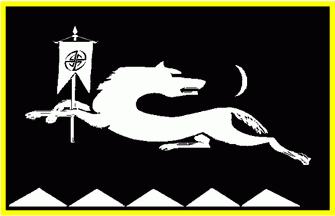 from Wikipedia, 10 Sep 2008
from Wikipedia, 10 Sep 2008Yet another nation of Dagestan (and Azerbaijan), this time the largest one - the Avars. Their complicated history, both medieval and modern, is presented at: http://en.wikipedia.org/wiki/Caucasian_Avars They total slightly over million people (together with absorbed, related nationalities like Andis, Akhvakhs, Botligs, Godoberis, Bagulals, Karatas, Tindis, Chamalals (all considered Avars), the Dido group, which includes Didos, Khwarshia, Bezhetas, Khunzals and Ginugs and, not so closely related, but belonging to the proto-Avar tribes - the Archis). About 815,000 Avars live in Russia (750,000 in Dagestan, the rest in Chechnia, Kalmykia, Moscow and elsewhere) About 160,000 live in Azerbaijan, 45,000 in Turkey and 2,500 in Georgia. Smaller communities can be found in Jordan, Germany and the U.S. They are overwhelmingly Sunni Moslems. Majority adhere to the Shafi rite. Their language belongs to Nakh-Dagestan branch of the Caucasian languages. Khunzakh dialect serves as lingua franca and is a foundation for the Avar literary language written in modified cyrillic script since 1938 (from 1927 to 1938 it was written in latin script, and before that in arabic) The town of Khunzakh is a cultural center of Avaristan and serves as an unofficial capital of the Avars. Although the Avaristan (the Avar homeland) has no official status, the nationalistic feelings of the Avars are strong and on the rise.
Recently, the modern version of the old Avarian Khaganate flag, white
wolf of the Huns on black, is gaining an acceptance as the national
flag of the Avars and of Avaristan. Original old flag is on display
at the Central Museum in Makhachkala. The modern flag shows the white
wolf holding a banner with swastika and looking backward toward the
crescent moon. It is framed in yellow. The Avar swastika is a common
symbol there since ancient times. Called "sswerdiro" in Avar
language, it means: "Power to Destroy - Power to Create: Power of God".
Chrystian Kretowicz, 21 May 2008
Our Latvian colleague, Ilmars Bite, just posted on RussoVex the best
yet image of the alleged flag of the Avars. This image differs from
the one which I ( and Avar Khunz) reported earlier, by the inclusion
of the representation of the stylized mountain range at the bottom of
the flag, as seen on the photo of the flag maintained by the museum in
Makhachkala.
Chrystian Kretowicz, 10 Sep 2008
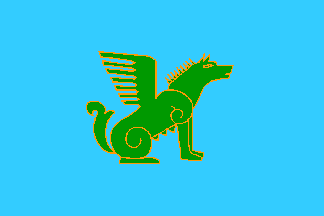
The beast portraited, flying lion with dog’s
head, sure fits the description of
Chelyabinsk/Bashkir simargl
— and though Daghestan (where the Nogai dwell) is
some 1500 km SW of Chelyabinsk
region, there may be a connection, as both
Nogay and Bashkir (the
second largest ethnical group in Chelyabinsk region,
after the Russians) are
(western) turkic
(slim connection, shared with eight other
proples of the Russian
Federation, but who knows…).
António Martins, 26 Dec 2002
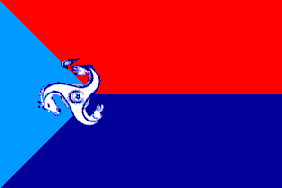
I’ve just seen on the french-german cultural TV channel Arte a
documentary about Daghestan, in which the flag of nationalist movement of
Kumukh people was shown (interview of its leader, with a big flag on the
wall and a table flag in front of him). The emblem on the flag is white
outlined black; the three “beasts” are linked together (as in the emblem
of Isle of Man), and the circle in the center is
is the border of zone where the three beasts join in one. In the center of
the circle, crescent and star, white outlined black.
Olivier Touzeau, 16 Mar 2000
On cpekacar.sitemynet.com/anadagkum.htm,
there are pics of Kumukh Arms, which are actually the flag with somewhat
different colors from this one.
Michael K. Renalds, 01 Jul 2002
I believe that several patterns exist; the basic design is what all people
agree.
Jaume Ollé, 22 Nov 2002
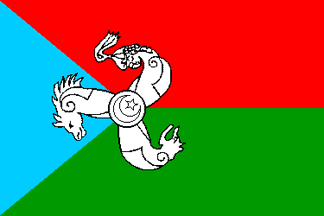
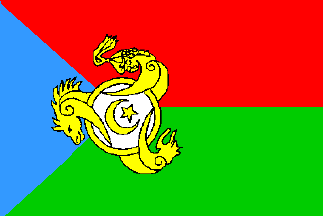
This image is from Gaceta de Banderas
[gdb],
information of Michel Lupant.
Jaume Ollé, 22 Nov 2002
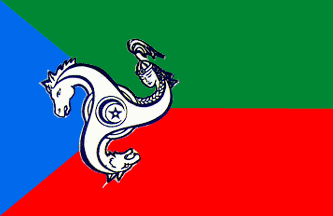
I remade the image according photo of real flag received from
Khadzhy Bayram Bolat (Turkey).
Order of stripes is different.
The flag is used by kumyk people in Dagestan and kumyk diaspora in Turkey.
Victor Lomantsov, 23 Sep 2006
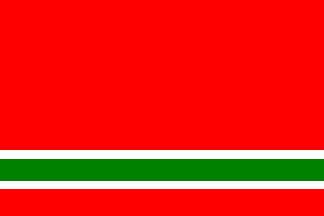
Lezgi (Lezgian, Lezghi, Lezgin, Kiurinsty) [LEZ] 257,000 in Russia
(1996); 171,400 in Azerbaijan (1996); 3,650 in Georgia; 2,570 in
Kazakhstan; 1,599 in Kyrghyzstan; 10,400 in Turkmenistan; 1,708 in
Ukraine; 1,585 in Uzbekistan; 1,200 in Turkey (1996); 451,000 in all
countries. Southern Dagestan ASSR, the western Caspian Sea coast,
central Caucasus. North Caucasian, Northeast, Lezgian. Dialects: Kiuri,
Akhty, Kuba, Gjunej,
Garkin, Anyx, Stal. Has literary status based on the Kiuri dialect.
Cyrillic alphabet. Some dialects are reported to not be inherently
intelligible with other. Mountain slope. Agriculturalists. Sunni and
some Shi’a Muslim.
Jarig Bakker, 07 Oct 1999, quoting from the
Ethnologue database
Lezghistan (or Lezgia) is the southernmost tip
of Russia, included in the multi-ethnic republic of
Daghestan. Its does include
also some neighbouring territory of
Azerbaijan
António Martins, 10 Aug 1999
This is flag use Lezgi people and Lezgic (Tabasaran, Aghul, Rutul, Archi and
other Lezgic group). This is flag name is "Lezgi flag" ore "Caucasian Albanian
flag"
Ruslan Baymashev, 12 July 2015
Previously Reported Flag

image by Jaume Ollé, 26 Apr 1999
Accordin Aliev Saumur this flag want to be:
It is not Lezghian flag! I am from Dagestan. Please remove this flag. Not
seeing misleading people and do not insult people Lezghian.
Ruslan Baymashev, 02 June 2015
This one needs some more digging - from a very brief look at the internet,
the symbolism of the flag is clearly used by the Lezgi.
Rob Raeside, 02 June 2015
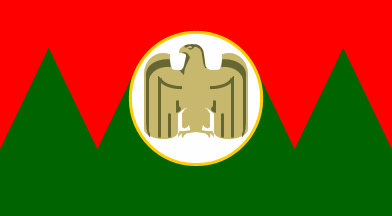
Lakku Bilayat - Zeml'ya Laktsev - Land of the Laks
Yet another nation within multi-ethnic Dagestan.
They are native to the region. Live in the mountains
of central Dagestan in Lakskiy and Kulinskiy Rayons.
Some were moved to the lowlands in 1944 to replace the deported
Dagestani Chechens.
Their language belongs to the Nakh-Dagestan group of the
North Caucasian linguistic family.
They number ca.157,000 (140,000 in Dagestan).
Sunni Muslims
Capital in the village of Kumukh.
Chrystian Kretowicz, 5 Mar 2008
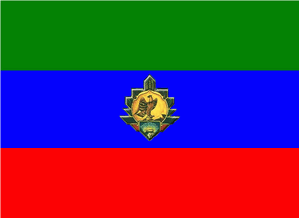
One of many Dagestani nationalities, Tabasaran number over 13,000 and live in the mountains in southeast Dagestan. They are second largest (after Lezgins) group of Lezgi-Samur linguistic community. Their neighbors are: Dargwas(north), Lezgins(south), Aguls(west) and Azerbaijanis(east).
The flag and emblem were adopted in 2006.
Chrystian Kretowicz, 28 Feb 2008
The flag of Tabasaran is a Dagestani flag with the Tabasaran
emblem in the middle
Chrystian Kretowicz, 16 Feb 2009